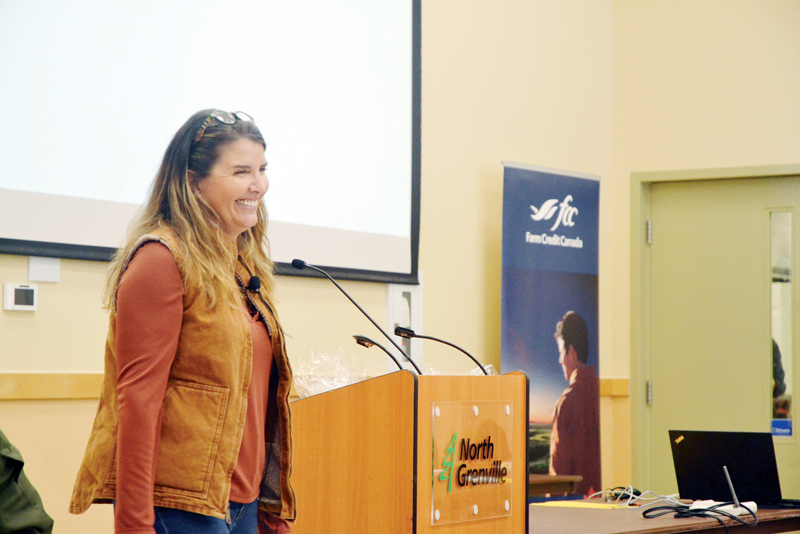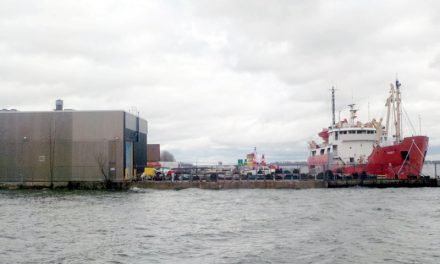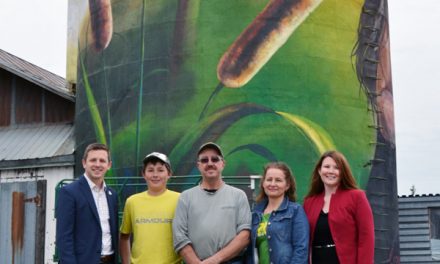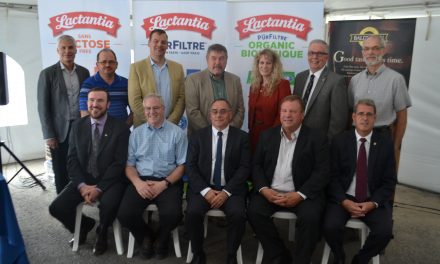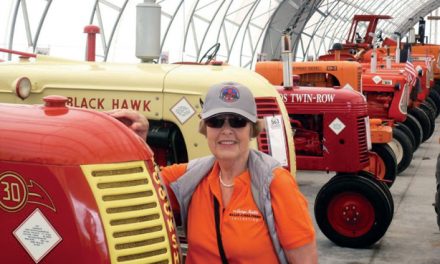Love for dairy
Sue McCloskey, creative director of Fair Oaks Farms and spokesperson for fairlife shared her love of dairy and innovation with the crowd at the Kemptville Eastern Ontario Dairy Days on Thurs., Feb. 14. McCloskey began by saying, “Why do you love dairy? First of all, it’s not only the love of our animals but the love of the people that we get to interact with. We farmers are the salt of the earth and there is nothing more honourable than being a farmer.” Sawyer Helmer photo

Carolyn Novick, director of fairlife, the Minute Maid Co., DFO board representative Nick Thurler and Sue McCloskey shared exciting news of an $85-million facility in Peterborough to produce fairlife brand milk.
Sawyer Helmer photo
KEMPTVILLE — When Sue McCloskey met her husband Mike she was an art history student and could have never thought she would be where she is today. McCloskey was swept up into the world of dairy farming and for years she and her husband ran a veterinary consulting practice in Southern California along with 300 head dairy.
Later in 1990 they sold the practice, moved to New Mexico to become full-time dairy farmers and started building Select Milk Producers, the sixth largest dairy co-operative in the U.S. With that team of like-minded farmers, they began thinking about the way milk is produced and marketed.
“We were all kind of thinking the same thing. Why isn’t there something better happening to milk? Not that there’s anything wrong with milk, because milk is a perfect superfood; it’s what we all grew up on; but there was no differentiation and we as dairy farmers and the whole dairy industry basically allowed ourselves to become this thing in the grocery store that became a price war. Who can sell the cheapest gallon of milk?” McCloskey explained. “What does that do in the minds of the consumer as far as giving a value to that product. If I can sell a litre of milk for $0.94 but a litre of Coke is a $1.50, well that Coke must be better than that litre of milk. This is the kind of thing that we were allowing to happen to dairy. So it was with this group of farmers that Mike and I met and banded together with, where we challenged ourselves to say: how can we make milk better, how can we make milk more relevant? So, we founded Select Milk Producers.”
McCloskey told the story to a crowd of dairy farmers in Kemptville during the Eastern Ontario Dairy Days. She attended the conference to help Carolyn Novick, director of fairlife, the Minute Maid Co., announce the development of an $85-million facility in Peterborough that broke ground in the fall of 2018 and is expected to be completed by spring 2020.
The product intended for the facility is fairlife; a U.S. originated ultra-filtered milk that provides consumers with options for less sugar, more protein, lactose free and more. McCloskey and her husband are some of the brains behind the product. In 1999, a few years after the creation of Select Milk Producers, they moved to North West Virginia where they built one of the country’s largest dairy farms; Fair Oaks Farms. It is also the country’s largest and most recognized agri-tourist attraction.
McCloskey is the creative director of Fair Oaks Farms and serves as spokesperson for fairlife. The plant in Peterborough is the first international expansion of the fairlife brand and one of the largest investments made by the Minute Maid Co. – a subsidiary of Coca Cola – in decades.
Novick told the crowd that Peterborough was a clear choice for the facility both because their juice processing facility is in the same location and because of Ontario’s “phenomenal milk.”
The product has launched in Canada already. Novick said that despite the current use of the U.S. produced product, once the facility is up and running the company is dedicated to using 100 per cent Canadian milk. “We’re coming to the Canadian industry building that plant with the absolute excitement to use Canadian milk once that plant is running. We’re really looking forward to the partnership that we have with the farming industry and using Ontario milk,” Novick said.
The products on shelves include four 1.5 litre milks (skim, whole, two per cent and chocolate), two small single serves and two 40 millilitres. “We have launched the product and have launched it using the milk from the U.S. out of the fairlife Coopersville Michigan plant. That was an absolutely critical thing to do in order to be able to build up that volume so when the plant is open, we can actually put some milk through it versus. It was a critical step that took a lot of consideration because we wanted to get into t his industry in the right way,” Novick added.
Once using Canadian milk, Novick couldn’t confirm that the blue cow symbol would be added due to the symbol’s strict criteria, but she assured that consumers would know without a doubt that the milk is Canadian.
McCloskey and Novick both shared their excitement for the venture agreeing that innovation will drive the industry and benefit not only the fairlife brand but dairy in general.
“Innovation is going raise all of our boats, not just fairlife’s boat, it’s going to raise everyone’s boat in the dairy industry. [Non-dairy alternatives] are what we are up against,” McCloskey said. “First of all, why do they call it milk? Why wouldn’t they call it soy juice, coconut juice, almond juice or oat juice? It’s because milk has a great halo because it is a great product and is a perfect food. So, they’ve taken this halo of goodness from milk.”
While McCloskey said she loves everyone who eats and supports the consumer’s right to having many choices, what she does not support is misinformation about the dairy industry.
“We are out there producing an incredibly nutritious product, incredibly safe and amazingly affordable. So we have got to stick together not only you as a Canadian farmer and not only me as an U.S. farmer, we’ve got to stick together as farmers across the planet. To have the same language, the same mission and the same story that milk is an incredible food,” she said.
There will be some requirements for the producers shipping to fairlife to follow, but Novick said the company is working closely with the Dairy Farmers of Ontario and once that information has been finalized, the DFO will share it with their members. Some of the American standards for fairlife include a somatic cell count of less than 200,000 and a BactoScan, of less than 100,000. Producers in the audience encouraged Novick and the DFO to nail down their criteria soon to give local producers time to meet the necessary targets before production at the facility begins in spring 2020.

